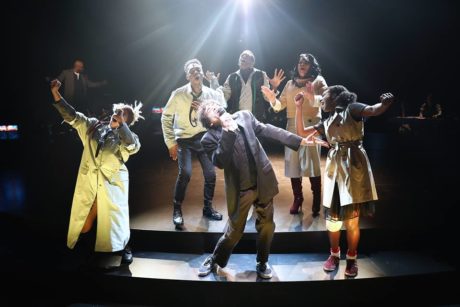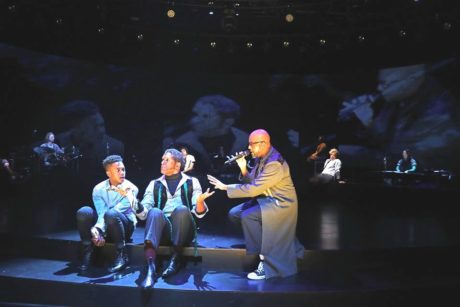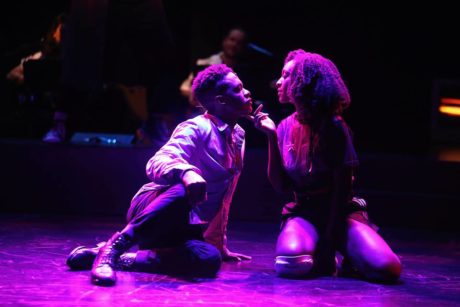“Life is a mistake that only art can correct.”
That’s not a line you’d expect to hear at a rock and roll show, is it? But Passing Strange isn’t your typical rock show, or musical, or biography. It examines the intersection of life and art, inspiration and creation, not to mention race and class. And while it doesn’t offer easy answers, its willingness to confront hard questions – over an electrifying, hard-rocking soundtrack – makes the Wilma’s new production one hell of a ride.

Passing Strange is based on the life of Stew, the singer-songwriter-book writer who starred in the show during its Broadway run a decade ago. (He’s one of the show’s creators, along with co-songwriter Heidi Rodewald and original director Annie Dorsen.) The show follows young Stew – here called “the Youth” – as he evolves from an aimless middle-class teenager in 1970s Los Angeles to a young man driven to find authenticity. (“We’re blacks passing as blacks,” his first mentor tells him disparagingly.) Youth’s voyage of self-discovery takes him from a church choir to Amsterdam to Berlin – echoing the lives of artistic forebears like James Baldwin and Josephine Baker, fellow African Americans who found acceptance and an artistic home in Europe. But Youth discovers that escaping racial preconceptions, and finding fulfillment, isn’t as easy as changing your address.
Director Tea Alagić’s production is fast-moving and dynamic, with an energy that pulls the audience into the story. But it’s got one major problem: the reconceived role of the Narrator. On Broadway, Stew narrated his own story while also singing and playing guitar with the four-piece backing band. But at the Wilma, Kris Coleman as the Narrator isn’t part of the band; he stalks the stage with a wireless microphone in his hand, weaving in and out of the action. With a Narrator less integrated with the band, Passing Strange seems less like a concert/musical hybrid and more like a conventional musical. Furthermore, while Stew would often raise an eyebrow to cast a skeptical glance at the absurdities around him, letting the audience in on the joke and silently encouraging the audience to see the story through his eyes, Coleman is a remote, inexpressive cipher for most of the show. With its more disconnected Narrator, the Wilma’s production comes off as too detached and clinical at times.
Still, Coleman is a fine performer with a robust voice. And so is Jamar Williams, who is sensitive, compelling and sympathetic as Youth. They receive fine support from a versatile cast, including Lindsay Smiling and Anthony Martinez-Briggs as a series of flashy and outlandish eccentrics; Taysha Marie Canales and Savannah L. Jackson as the women who alternate between offering Youth temptation and tart commentary (though their roles are too limited and repetitive); and Kimberly S. Fairbanks, who brings sincerity and elegance to the role of Youth’s patient but struggling mother.

Stew and Rodewald’s score veers from gospel (“Church Blues Revelation”) to ragtime (“The Black One”) to punk rock (“Sole Brother”) to heavy metal (“May Day”), always with a sturdy melodic foundation. Most of the songs are elastic, stretching out to allow for insertion of narrative, while others, like the hilarious cha-cha “We Just Had Sex,” come to a halt just when they’re getting interesting. The excellent four-piece onstage band, led by Amanda Morton, amps up the excitement, though Nick Kourtides’ sound mix obscures Stew’s witty lyrics at times.
Scott Pask’s set design uses an oval playing area that focuses and consolidates the action; it’s a dark void which Thom Weaver’s lighting pierces with overhead spotlights and TV monitors. (Weaver uses strobe lighting during the second act opener “May Day,” pushing the special effects to painful extremes.) There’s an extensive use of projections, sometimes using live video, credited to Christopher Ash and Tal Yarden, while Constantine Baecher’s clever choreography helps to move the story forward. And Vasilia Zivanic’s costumes add an extra touch of humor to the more bizarre characters Youth meets on his journey.
Despite a few nagging flaws, the Wilma’s Passing Strange is an invigorating exploration of a young man finding himself in a hostile and unwelcome environment, and finding himself by finding his art. It’s vivid, vital, and a lot of fun.
Running Time: Two hours and 15 minutes, including an intermission.

Passing Strange plays through Sunday, February 18, 1018 at The Wilma Theater – 265 South Broad Street, in Philadelphia, PA. For tickets, call the box office at (215) 247-9913, or purchase them online.




